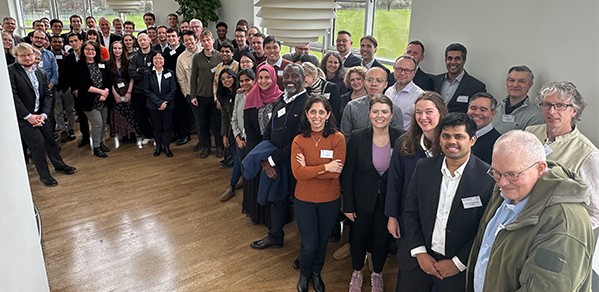
The Civil Engineering Division has been successful in its bid for a Centre for Doctoral Training in Future Infrastructure and Built Environment: Unlocking Net Zero (FIBE3 CDT) – building on the strength of its two CDT predecessors FIBE and FIBE2.
The huge success of our FIBE CDTs is all down to our highly talented and committed students, staff and industry partners who have supported us all the way.
Professor Abir Al-Tabbaa
The EPSRC-funded CDT will focus on meeting the user needs of the infrastructure and built environment sector in its pursuit of net zero by 2050. The £8.1 million funding from the EPSRC is supported by £1.3 million funding from the University and more than £2.5 million from industry, as well as more than £8.9 million of in-kind contributions.
More than 70 fully funded studentships will be made available over the next five years. Recruitment is underway for the first FIBE3 CDT cohort who will start in October 2024.
Of all the new CDT investments officially announced today (12 March) by Science, Innovation and Technology Secretary Michelle Donelan, FIBE3 is the only Cambridge-led CDT from the Department of Engineering.
The FIBE3 CDT is a collaboration between the University, more than 30 industry partners and eight international academic centres, with a shared vision to lead a transformation to net zero infrastructure. This will be achieved through the ambitious and unique FIBE3 CDT vision and strategy: to develop the next generation of highly talented doctoral graduates who will be equipped to lead the design and implementation of the net zero infrastructure agenda in the UK.
The FIBE3 CDT strategy revolves around two main elements: the FIBE3 Roadmap and the 4D T-shaped training model.
The FIBE3 CDT academics, industry partners and students will collectively generate a live and dynamic FIBE3 Roadmap that will act as the umbrella to guide all the CDT activities and its evolution and expansion. The Roadmap will be updated annually to ensure that the CDT continues to address the needs of the sector to deliver ambitious yet realistic and achievable outcomes.
The FIBE3 Roadmap will be built around four high level thematic enablers. These are:
- Current and disruptive/new technologies. A mix of existing and new technologies will be required to drive delivery of net zero infrastructure as advances e.g. in carbon capture and storage (CCS) and emissions-free energy will not be available in time. Major advances using existing technologies e.g. in off-shore wind and geothermal energy, low carbon construction materials and evidence-based sensing technologies, are waiting for targeted implementation. Rethinking and innovating the way we design, construct and maintain our infrastructure is a further imperative.
- Radical circularity and whole life approach. Circularity will require a focus on resource efficiency, minimising waste, using low carbon materials, and keeping materials, products and assets in use for as long as possible. It will also necessitate a whole-life carbon approach to infrastructure and requires research on sustainability and resilience.
- AI-driven digitalisation and data. Our civil infrastructure industry is not well equipped to deal with 'big data'. There is an urgent need to develop tools e.g. machine learning approaches to extract meaningful and actionable information from the unprecedented increase in data. Advanced Digital Twins will enable modelling of ‘what if’ future low carbon infrastructure scenarios and consequences and provide evidence-based decision support for action. Focus on data will include data generation, integration, interrogation, reliability and sharing.
- Risk-based systems thinking and connectivity. Infrastructure is a system of inter-connected systems, and its transformation is constrained by the slow deployment rates of large-scale public works and competition for constrained resources. Working with users, we will explore risk-based analysis of infrastructure design and resilience both to anticipate delivery risks and to anticipate business growth opportunities compatible with zero emissions.
The 4D T-shaped training model builds on the successful FIBE2 CDT 3D T-shaped model consisting of depth, breadth and cross-disciplinarity as the third dimension. In FIBE3, a fourth dimension of industry and collaboration has been added to represent the central role that collaboration with industry will play in shaping all the FIBE3 CDT training elements.
FIBE3 will continue with the successful 1+3 MRes/PhD programme. The first year – the MRes year – being a taught master’s in research with extensive cohort building activities. It will provide high level broad training on net zero infrastructure challenges and opportunities and will be delivered with significant input and involvement from the industry partners. It will include a combination of modules and project work as well as an MRes thesis.
The PhD topics will be generated annually from the FIBE3 Roadmap for recruitment and students will be recruited to specific projects with industry sponsorship. The PhD experience will be strengthened with secondments to the industry, academic and government and wider cohort engagements at national and international levels.
The FIBE3 CDT will work closely with other successful CDTs across Cambridge, as well as on a national level, particularly in the context of equality, diversity and inclusion; responsible research and innovation; trusted research; environmental sustainability; and student welfare.
Professor Abir Al-Tabbaa, Principal Investigator of FIBE, FIBE2 and FIBE3 CDTs, said: “The huge success of our FIBE CDTs is all down to our highly talented and committed students, staff and industry partners who have supported us all the way.
“Infrastructure is now at the top of the government agenda, particularly in the context of delivering net zero. This is partly because our infrastructure sector is responsible for significant CO2 emissions, significant energy use and significant consumption of natural resources. It is also partly because, as highlighted in the recent government Skidmore review titled Mission Zero, infrastructure is the key to unlocking net zero: infrastructure is fundamental to the development and delivery of net zero technological solutions for which there is significant need for research and development.”
- Read the announcement by the Department for Science, Innovation and Technology (DSIT).
- Read the announcement by UK Research and Innovation (UKRI).

